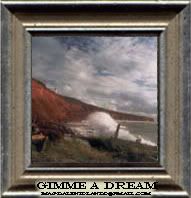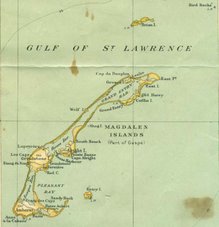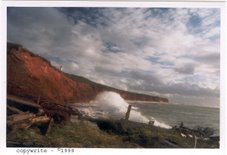The drinking water in fourteen Point-aux-Loups residences was tested recently. The study was done to find any indication of contaminants in the water table of the Magdalen Islands. The test was also done in the water system on Grindstone Island. All was declared at normal standards.
According to the superintendent of governmental intervention for the Canadian Coast Guard, Martin Blouin, some samples had also been sent to the laboratory for further testing for the Minister of Sustainable Development, Environment and Parks.
Mr. Blouin stressed that the analyses done was very sophistic and would have shown fit there had been traces of PCB’s contaminating the water. But there was no link involving the water table and the Irving Whale.
However, there are two pilot projects aloft to find a way to dispose the bags of contaminants that were buried in the sand dunes since the wreckage. The bags must ultimately be brought out.
The Irving Whale was a shipping barge belonging to the Irving Oil LTD., that had sunk in the Gulf 60 km north-east of PEI and North Point and south west of the islands on September 10th, 1970. She was carrying a load of heavy bunker C oil, which contained the PCB's.
Some of the oil escaped and washed up along 80 km of beach on the western side of the Magdalen Islands. The majority of the oil remained on board the barge, which laid 67 meters on the seabed. However, during the cleanup on the islands, almost 200,000 large garbage-sized bags filled to capacity of the PCB contaminated congealed oil were buried into the dunes on the Magdalen Islands.
During the autumn of 2008, some of those bags surfaced near Pointe-aux-Loups and have caused the residents of of the village to hold several demonstrations to petition to have the bags removed for Magdalen Islands soil. The reason for the removal is that it is an environmental time-bomb on an already fragile environment.
Did You Know:
• The Irving Whale sinking was blamed on stormy seas and unsecured hatches on the barge, which was being towed by a tugboat called the Irving Maple.
• Built in 1966, the Irving Whale was an oil supply barge serving the coastal areas of Atlantic Canada. It was about as big as a hockey rink and was laden with about 4,200 tonnes (about five million litres) of heavy bunker C fuel oil.
• After the Irving Whale sank, an oil slick covered an area of about 650 square kilometres. Divers secured the hatches to prevent the leakage of more oil, which was already slowing because the cold waters of the Gulf of St. Lawrence had made it congeal.
• The Irving Whale was owned by Irving Oil, a gigantic oil company and shipbuilder based in Fredericton, N.B. Founder K.C. Irving said the company was monitoring the situation "like a cat on a mouse" and, when asked who was responsible for the cleanup, said he hoped there would be nothing to clean up.
• When the federal government approached Irving Oil just days later to recoup over three million dollars in cleanup costs, Irving said that because the event had happened beyond Canada's 12-mile territorial zone, the company was not subject to Canadian jurisdiction. In fact, the law was on its side, rendering the government powerless and prompting new legislation aimed at bettering government control over oil pollution.
• Irving Oil was compensated for the loss by its insurance company, which in turn made no effort to recover the barge or its cargo.
• Environment Canada has predicted that "Based on current levels of tanker traffic, Canada can expect over 100 small oil spills, about 10 moderate spills and at least one major spill offshore each year. A catastrophic spill (over 10,000 tonnes) may occur once every 15 years."
• Between July 30th and August 8th, 1996, the Irving Whale was raised from its watery grave and brought to dry dock in Halifax, at the expense of Canadian taxpayers.

![]()




![]()

![]()
![]()
![]()
![]()


![]()



















